Greenwich was just becoming aware of a slew of proposed legislation aimed at increasing affordable housing when a bill was proposed to prohibit towns from limiting access to beaches based on residency.
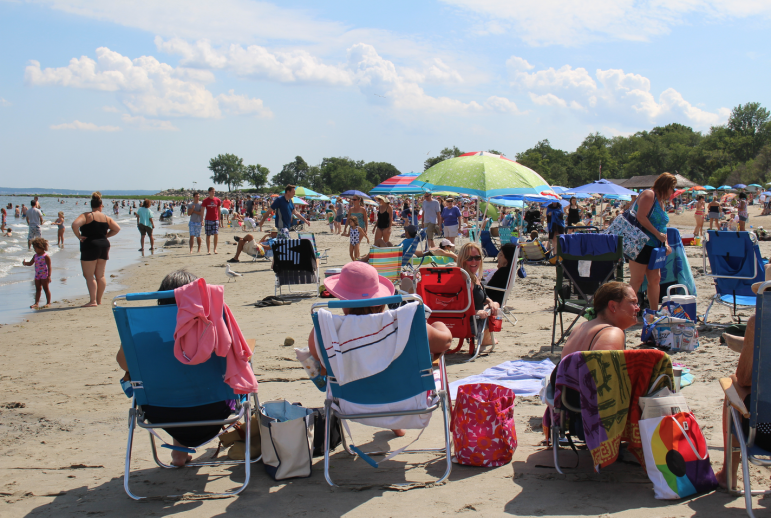
Bill No 6351, proposed by Democrat Roland Lemar (D-96) who represents portions of New Haven and East Haven, would prevent beach towns from giving residents priority, from charging more to non residents, even if a town had concerns about capacity.
Here in Greenwich, this is not the first time beach access policy has made headlines.
Brenden Leydon of Stamford sued the town after he was turned away at the Tod’s Point gatehouse in 1994 during a jog because he was not a resident.
Leydon filed filed a lawsuit that initially failed. He persisted.
During the lawsuit, the nation watched Greenwich. Comedienne Janeane Garofalo and a bus load of her friends from NYC were sent by Michael Moore of TV Nation to Tod’s Point, only to be turned away.
Undaunted, Garofalo and friends clamored off a tugboat into dinghies to row toward the shore. The Coast Guard and Greenwich Police Marine Division were not amused.
When Garofalo and friends jumped from the dinghies and swam to shore, residents told the interlopers to simply buy a property in Greenwich. Then they were escorted out.
Leydon’s case eventually went to the State Supreme Court, defeating a major legal defense by the Town of Greenwich. The Court ruled that Greenwich could not prohibit nonresidents from the beach because it constituted a public forum under the First Amendment of the US Constitution. (Further, the Court said that the easement granted by Lucas Point Association over the causeway to Tod’s Point could not be limited to Greenwich residents.)
After the Court issued its ruling, Greenwich created a fee structure that was deemed reasonable under the Supreme Court ruling.
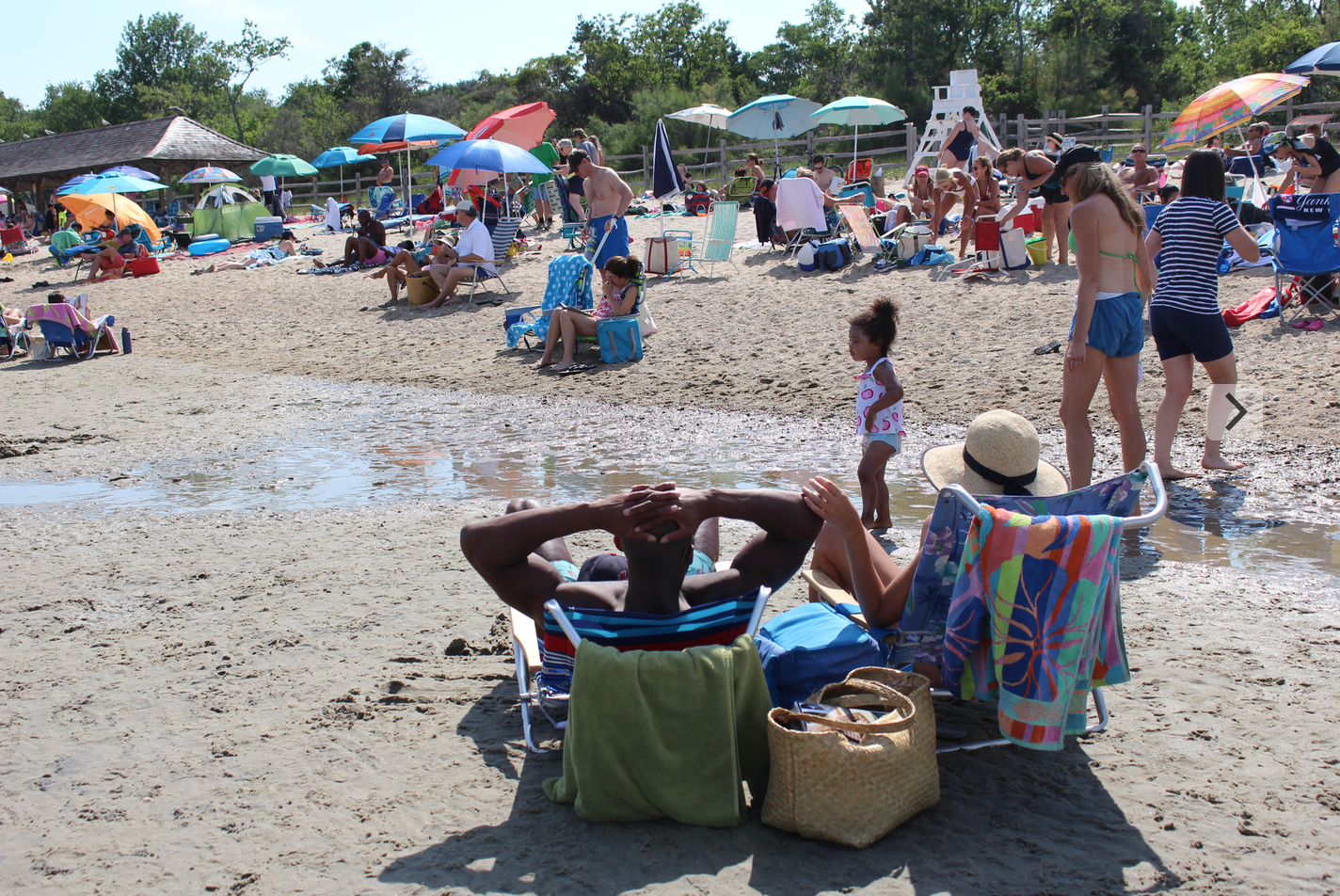
Greenwich’s beach fee structure is slightly different than other beach towns in CT, many of which charge much higher fees for non residents.
In Greenwich it costs a non resident $40 per car, plus a per person fee of $8.00 (just increased to $9.00 for 2021 season).
In Stamford a season permit for a resident is $26.59, or $292.46 for a non resident.
In Fairfield, a seasonal sticker for the beach, marina and dump is $25 for a resident with a vehicle registered in Fairfield; a non-resident seasonal sticker for Jennings and Penfield beaches is $250.
In an interview in CT Mirror, State Rep Lemar called out Westport specifically. In that town, the fee for a season parking pass is $50 for residents, $375 for residents of Weston, and $775 for non residents.
Pandemic Notwithstanding
Beyond the price differential, Lemar’s bill would prevent towns from closing beaches to non-residents, even during the pandemic.
Lemar told CT Mirror, the bill would prevent communities from barring beach visitors from other towns on grounds that it would prevent COVID-19 spread, saying, “It doesn’t surprise me that every approach that any of these communities take is to limit who can access public beaches.”
Typically Tod’s Point is open to on residents from December through April. However, citing the Governor’s Emergency Order, Greenwich is not admitting non-residents this winter.
At the onset of the pandemic, crowds flocked to Tod’s Point. On Saturday, March 21, there were 8,433 visitors to the park. The parking lot featured hundreds of cars with New York license plates.
After all, Greenwich is the first town over the state line from New York.
After that weekend, the Town closed down the park completely.
In May the park partially reopened with a one way loop for walkers, joggers and bicyclists, though the beach was closed. To allow for safe social distancing, capacity was limited to 500 visitors with either a 2019 or a 2020 Greenwich park pass, or a state issued ID or driver’s license with a Greenwich address.
When the beach did reopen in the summer, Parks & Rec put 15 ft diameter hoops in the sand for family pods to sit inside, and allow for social distancing.
Currently the gatehouse at Tod’s Point is staffed and people are being turned away if they don’t have a resident park pass.
Staffing the gatehouse has created an additional cost to the Town of $25,000.
At the January Parks & Rec meeting, director Joe Siciliano cited the State of Emergency declared by Governor Lamont as a reason to exclude non residents and maintain social distancing.
“I was at the beach a couple days after Christmas. It rivaled a 4th of July weekend,” said Parks & Rec chair Gary Dell’Abate. “For the guards, it’s well worth the money. I’ve been down there several times on a weekend or a nice day where it’s 20 cars deep to get in.”
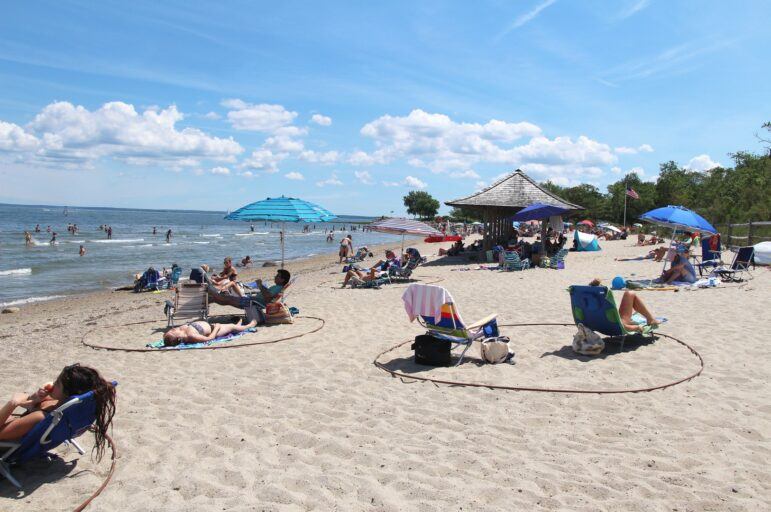
Mr. Siciliano said staff keep track of cars, people, turnarounds and walk-ins, and that during the pandemic, typically about a third of cars are turned away from the gate.
“This will not continue into other years,” he said.
“For the sake of our state, please get to work on legislation that is forward thinking and smart, not divisive and attention getting.”
Greenwich First Selectman Fred Camillo
Lemar’s proposal would prevent a town from charging more than Connecticut does for state parks. But, since 2018, there has been no fee for CT residents to enter state parks including, for example, Hammonasset State Park in Madison where there is 2 miles of beach. To make this possible, an increase in vehicle registration fees was passed by the General Assembly.
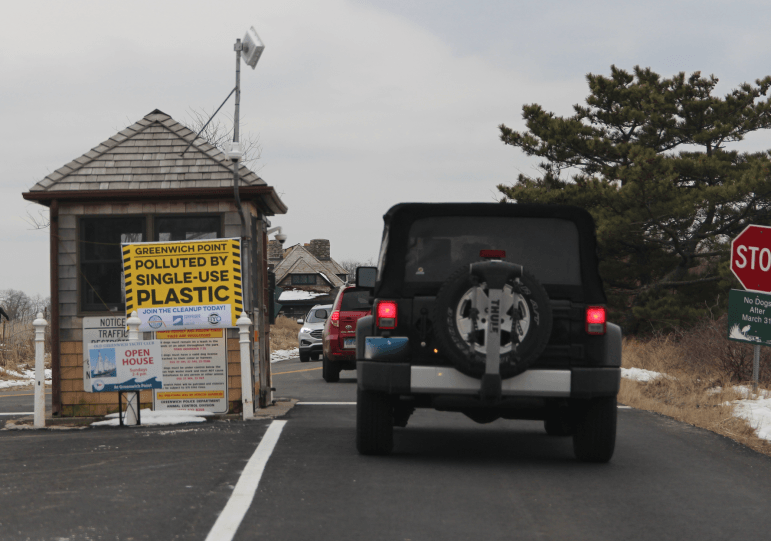
Lemar’s legislation goes way beyond the Laydon law suit and the issue of free speech.
But it doesn’t feel different to residents, who again ask why should they foot the bill through their property taxes to staff and maintain the beach for non residents?
State Rep Steve Meskers, a Democrat whose 150th district covers the shoreline from Byram to Old Greenwich, said the Town’s existing policy is reasonable and has already been tested in court.
“We attempt to give fair and reasonable access to non-residents,” he said.

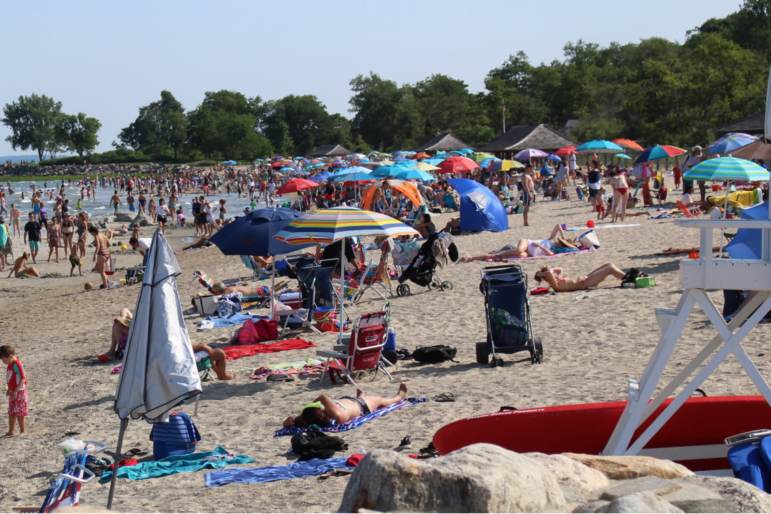
“We’re a community of 60,000 people with limited beach resources primarily maintained by the residents of Greenwich,” Meskers added.
Also, because of the fee for cars, there is already the problem of non residents parking illegally on neighboring streets, and walking or biking in with just a day pass.
“Am I supposed to give a first come first served to a resident of Stamford and charge the same price?” he asked.
Meskers, who noted that the Town only has one functioning beach – The beach in Byram Park is small and the main draw is a swimming pool – wondered whether town residents might get a break on their taxes if they lose priority at the beach?
Further, he said there is a perception that Greenwich is a wealthy, homogeneous community. It is not.
“We represent a diverse community,” he said. “People fail to realize that.”
“It would be unfair for a system that is already constrained by sized and a large and diverse population to essentially grant priority to non residents,” Meskers said.
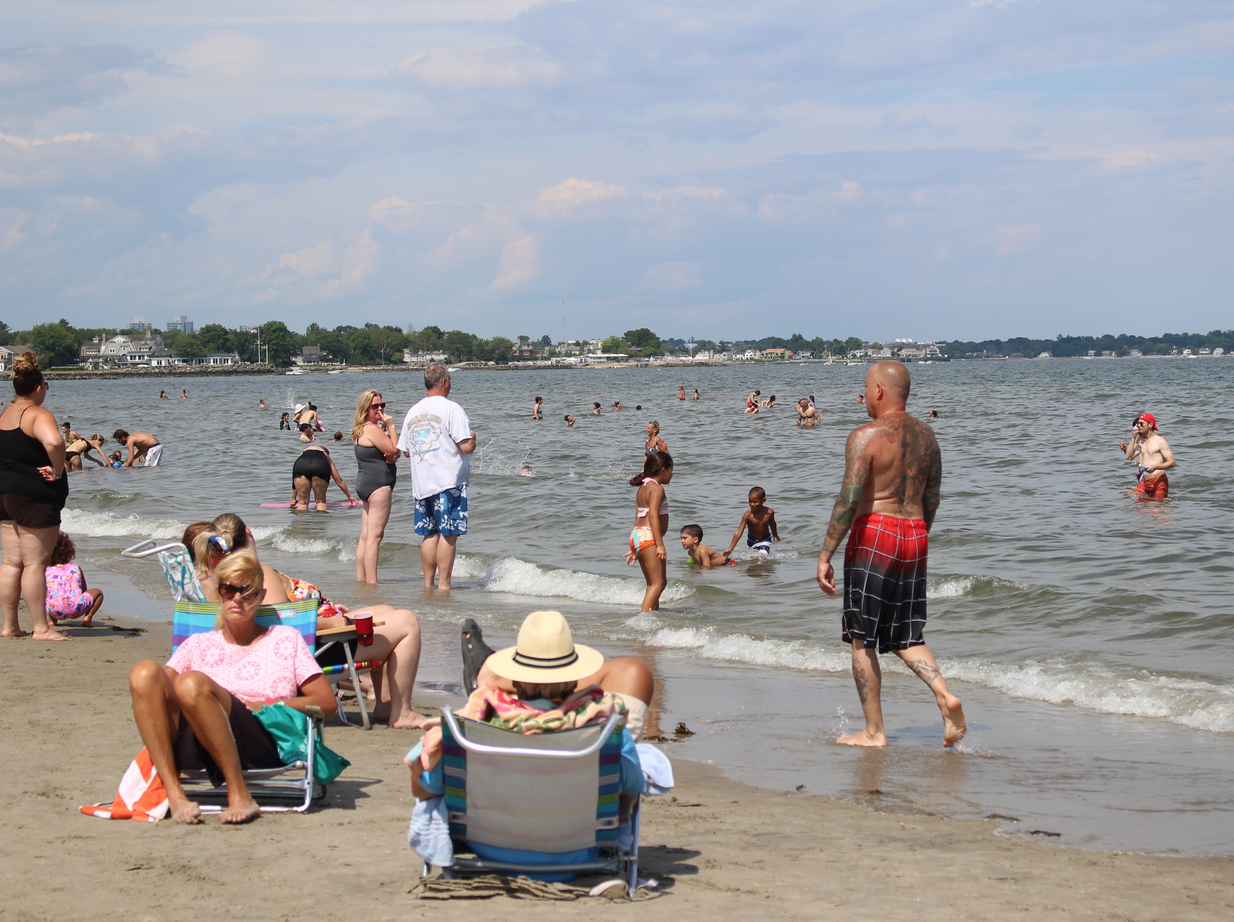
“Greenwich is an economically diverse community of residents with limited capacity at the beach. In trying to balance needs of residents with non residents, I think we’ve struck a fair bargain.“
State Rep Steve Meskers (D-150)
According to the Greenwich United Way, in 2020, 29% of households in Greenwich were at poverty (7%) or ALICE (27%) (Asset Limited, Income Constrained, Employed), meaning unable to afford life’s basic necessities.
Further, Parks & Rec issues about 1,000 free beach passes annually to those in need.
Greenwich First Selectman Fred Camillo also said he thinks the Town’s existing policy is fair.
“With Connecticut ranked consistently near the bottom of the list when it comes to business friendliness and economic competitiveness, I would hope legislators devote their attention to returning Connecticut to a prominent place in commerce,” he said. “We can be a vibrant economy again if we make tough decisions for the state as a whole, and not just what plays well in one’s legislative district.”
Camillo said bills like Lamer’s distract from more urgent issues at hand.
“In Greenwich we were one of the only towns to remain open to non-residents during the pandemic, save for when we entered a red zone. Our beach access policy has been very measured, open, and well thought out, as well as reasonable and fair.”
Camillo’s parting message: “For the sake of our state, please get to work on legislation that is forward thinking and smart, not divisive and attention getting.”
Along with Senator Martin Looney and others, State Rep Lemar has introduced several bills concerning affordable housing:
SB00487 would permit a housing authority to expand its area of operation to include certain high or very high opportunity census tract within a fifteen-mile radius
SB00551 would require that 50% of land within 1/2 mile of transit stations and commercial corridors be zoned for multi-family housing and that accessory dwelling units be permitted as of right.
SB00808 would amend CT General Statutes to (1) require an additional property tax for any municipality in which less than 10% of all dwelling units are affordable housing, and (2) use the revenue from such additional property tax to fund social services, affordable housing and other support programs in other municipalities
State Rep Lamar also proposed SB00744 “To define further the property tax exemption applicable to property owned by Yale University.”
He is married to Anika Singh Lemar, a Yale-based attorney, who is an advocate for State interventions in local zoning.
Ms Singh Lemar, who opposes any weakening of section 8-30g in the CT General statutes, is involved with a test case in Woodbridge where there is no multi family zoning.
The suggestion is that the town’s regulations have kept out low and middle income families who are disproportionately Black and Hispanic. They are asking Woodbridge’s Planning & Zoning Commission to approve an application for a four-unit house on a 1-1/2 acre zoned for a single-family home.
See also:
Jumping through Hoops to Get to the Beach
June 2020
COVID-19 UPDATE: Camillo Orders Town Parks & Beaches Closed
March 2020
Serious Overcrowding at Tod’s Point May Result in Increased Police Presence Next Summer
December 2015
Are Greenwich Beaches Too Crowded?
August 2015